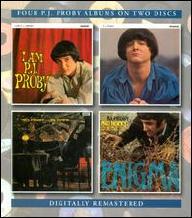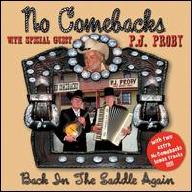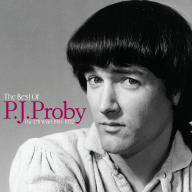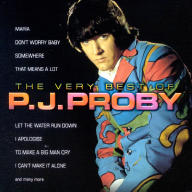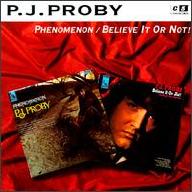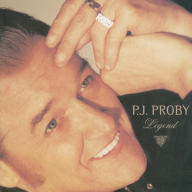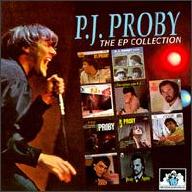Meanwhile, Smith was working on his own original songs, which earned him a composition contract with Liberty at the end of 1959; his material was recorded by Johnny Burnette (Clown Shoes), the Searchers, Leroy Van Dyke, Rick Nelson, and Jackie DeShannon, among others. He also briefly joined producer Kim Fowley's studio group the Hollywood Argyles in 1960. In 1961, Smith (probably wisely) changed his alias from Jett Powers to P.J. Proby, the name of a childhood friend of Sharon Sheeley. Proby cut several singles from 1961-1963, ranging from rock to pop to country, again without much luck or promotion. With the single Wicked Woman, he even resorted to changing his name to Orville Woods in hopes of getting played on RB radio stations.
Finally, in late 1963, Proby met British producer Jack Good, who happened to be putting together a TV special on the Beatles that was to feature several other up-and-coming artists. Proby's demo tape impressed Beatles manager Brian Epstein enough for him to make the cut, and Good outfitted Proby as an aristocratic fop, complete with ponytail, frilly shirt, tight velvet pants, and buckled shoes. After the special aired worldwide, Proby's first British single, Hold Me -- a rocked-up rearrangement of a 1939-vintage pop ballad associated with Dick Haymes -- rocketed into the U.K. Top Five in early 1964. Proby's next two singles, Together and +West Side Story's Somewhere, took a similar tack, and both reached the British Top Ten as well. In early 1965, Proby was booked as part of a package tour, and on one of the London dates in late January, his pants ripped open from the knee all the way up. Proby claimed it was an accident, but when the same thing happened at the next show (much to the audience's delight), the censors descended and banned Proby from performing on television or in theaters. Rushed out shortly after the ban, I Apologise just missed the Top Ten, though his detractors didn't take its sentiments to heart.
Proby continued to release singles over the next two years, scoring another Top Ten hit with another +West Side Story cover, Maria, in late 1965. (Oddly, the preceding single, That Means a Lot, flopped despite being penned by John Lennon and Paul McCartney.) The lack of promotional opportunities began to hurt Proby's chart placements, though, and he was also beset with financial problems. He attempted to crack the American market in 1967 and actually did land a Top 40 hit with Niki Hoeky, which proved to be the extent of his success in his native country. Proby was forced to declare bankruptcy in 1968; in 1969, he recorded an album, Three Week Hero, that featured studio backing from all four future members of Led Zeppelin. By this time, though, the hits had dried up. Thanks to Jack Good, Proby appeared in +Catch My Soul, a musical version of +Othello, in 1970, and subsequently became a regular on Britain's cabaret circuit.
In 1973, Proby cut a less-than-stellar album, I'm Yours, under somewhat shady circumstances for Ember. He also made headlines with his engagement to Dean Martin's daughter Claudia, and his subsequent arrest for brandishing a shotgun. Proby re-emerged in 1978 to record an album with the Dutch prog rock group Focus, Focus Con Proby, and shortly thereafter starred in a Jack Good-produced musical about Elvis Presley (from which he was fired for improvising). Proby recorded sporadically during the '80s, including a series of more contemporary covers, and was also beset by marital difficulties and occasional run-ins with the law over flashes of temper. He nearly died after collapsing in 1992, and went completely sober afterward; in 1993, he appeared in the Jack Good biographical musical +Good Rockin' Tonite, and two years later in the Roy Orbison tribute show +Only the Lonely. Proby attempted a recording comeback in 1997 with the EMI album Legend. ~ Steve Huey, Rovi


